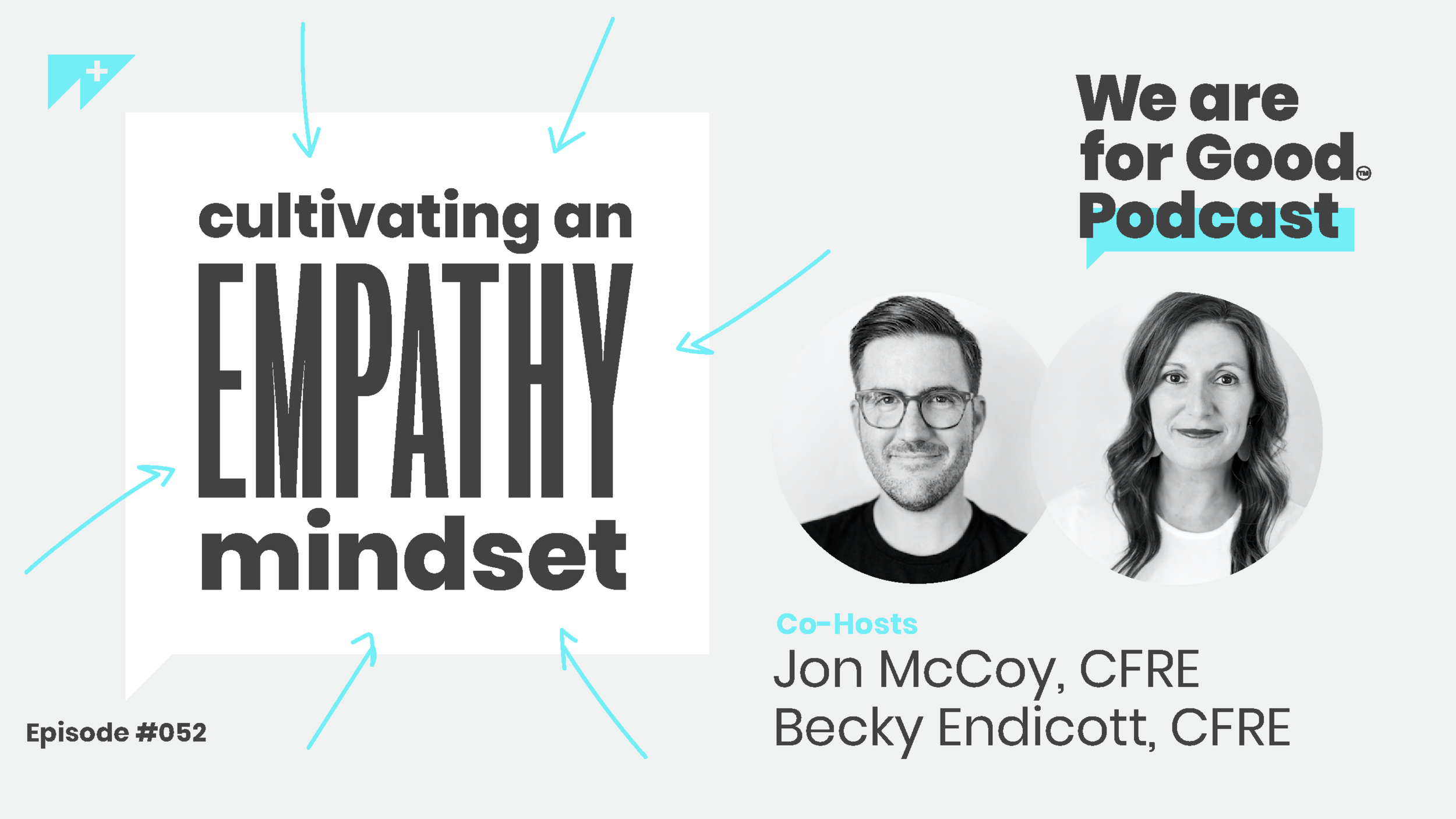52. Cultivating an Empathy Mindset- Jonathan McCoy, CFRE and Becky Endicott, CFRE
Listen to this episode
Overview
Hold on to your butts (<- one of Jon's favorite movie quotes of all time), because these two empaths are diving deep into compassion today. Join Jon and Becky as they chat through how to flex your empathy mindset for good. Empathy gives us the ability to put ourselves in other people’s shoes so we can see and feel from their perspective, and this is a healthy value to self-explore at work or home. We'll walk through the 7 Tips to be More Empathizing and even explore some dismissive self-talk that's keeping us from connecting more deeply with our donors and our people.
“Showing empathy is what mission based organizations are all about. We are trying to move the hearts and minds of people so that we can move into a space of wholeness, fulfillment, and solving the world’s problems.”
How to think of fundraising as an art, not a science
Our number one priority: checking on your people
90% of employees say empathy is the most important workplace value
Recognize your thought patterns, and examples of thoughts that may flag that you need to double click on developing more empathy
Set goals for yourself. This isn’t an innate gift for everyone, but you can begin planting seeds today
Tips to help you cultivate an empathy mindset
Empathy: An experience of understanding another person’s thoughts, feelings, point of view, and experiences that are different from our own.
Powerful quotes
“You can be a professional who has taken all the classes, has all the accreditations, and knows all the theories, but if you don’t bring that emotional intelligence, humanity, and empathy into what you’re doing you’re missing out on a vibrant and whole organization.” -Becky
“Earlier this year everyone was looking for a playbook on what to do. The number one thing everything was saying was to check on your people. Why did we have to seek counsel for that?” -Jon
“Showing empathy is what mission based organizations are all about. We are trying to move the hearts and minds of people so that we can move into a space of wholeness, fulfillment, and solving the world’s problems.” -Becky
“We have to be really intentional in how we reach out and the way we do with compassion and grace, and that applies to everyone.” -Becky
“If you’re not addressing these things, you really are just dancing around the problem, and that problem is never going away.” -Becky
“We have watched you all lift each other up, and that is such a boost for us. This is a community of kindness, and we believe we can be even better and more successful professionals if we employ empathy mindsets.” - Becky
Tips to help cultivate an empathy mindset
1. Ask questions.
It is impossible not to have empathy when you sit down with someone and are present and talk to them, and truly listen. Try to block out everything else that is happening and zone in.
2. Seek to understand. Look for context.
It is ok if you don’t wear your heart on your sleeve. Are people quiet and distant? Are they having trouble meeting deadlines? If we aren’t so busy in our own heads, we can notice red flags.
3. Check in with your team regularly.
If you are leading a team, find ways to check in regularly. Millions of people are practicing social distancing, and those feelings of isolation, anxiety, depression, and stress are beginning to emerge as large aftershocks of the pandemic.
4. Communicate, using all of your senses.
Look for things that are nonverbal cues. This can’t just be via text or on Zoom. We have to be mindful and find a way to communicate with someone. You can write a letter, send them a card, flowers, or whatever is comfortable for you. There are free and affordable things you can do to show someone you care about them.
5. Adapt your approach to different people and situations.
We don’t all have the same love languages and gifts. If you know someone’s personality type, tap into that and understand how to better connect with that individual.
6. Recognize your thoughts
If you’re saying things like:
“I need to get out of this conversation as quickly as possible.”
“This person would rather be left alone.”
“It’s not my job to caudal people, especially at work.”
“I have more important things going on.”
“If I don’t say the right thing, I might make this worse.”
You may want to double click and check on how empathetic you are being.
7. Set goals for yourself: begin planting seeds.
Regularly check in with people, see if they need anything. Find a way to begin feeling a little more comfortable with discussing emotional topics. Think about different ways you can provide support, even if it is a simple text.
Becky’s Bonus: Read books! Especially fiction.
Put yourself in the shoes in a life that you never get to live. We learned so much from Kirby Mackenzie in our episode 33 . They believe in letting children get lost in books and learning empathy through going to different places, hearing different world views- all through stories.
Connect with Jon
Connect with Becky
Watch this episode







